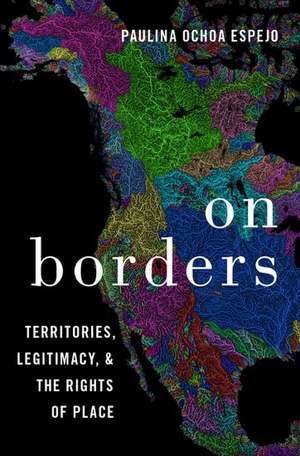On Borders: Territories, Legitimacy, and the Rights of Place
Autor Paulina Ochoa Espejoen Limba Engleză Paperback – 8 sep 2020
Preț: 289.38 lei
Nou
Puncte Express: 434
Preț estimativ în valută:
55.39€ • 60.19$ • 46.56£
55.39€ • 60.19$ • 46.56£
Carte disponibilă
Livrare economică 01-15 aprilie
Preluare comenzi: 021 569.72.76
Specificații
ISBN-13: 9780190074203
ISBN-10: 0190074205
Pagini: 344
Dimensiuni: 155 x 231 x 23 mm
Greutate: 0.54 kg
Editura: Oxford University Press
Colecția OUP USA
Locul publicării:New York, United States
ISBN-10: 0190074205
Pagini: 344
Dimensiuni: 155 x 231 x 23 mm
Greutate: 0.54 kg
Editura: Oxford University Press
Colecția OUP USA
Locul publicării:New York, United States
Recenzii
Paulina Ochoa Espejo's On Borders: Territories, Legitimacy, & the Rights of Place offers an indirect response and critique of the limitations of cosmopolitan frameworks as they relate to place-based politics via an analysis of borders and bordered thinking.
Even for those who still believe that traditional territorial borders are very real because they matter in multiple ways, the book certainly comes recommended.
Richly textured and deeply insightful ... Ochoa Espejo's book is a splendid read, and in my view should be required reading for scholars of borders from all disciplines.
Explores borders, territories, and inclusion in terms of place, examining the practices and physical structures that constitute the localized, concrete character of people's experiences.
Banging on about 'broken borders' is the major leitmotif of contemporary populism in Europe and the United States. This subtle and engaging exploration of borders as a theme in political philosophy shows how much about them is obscured when questions of immigration policy and territorial sovereignty are bundled together with the 'border question.' In placing borders at the center of analysis, this book effectively demolishes and replaces the very basis to the current debate about their meaning
Ochoa Espejo urges us to think place apart from presumed national identities in border politics. Foregrounding the politics of peoples and the earth, and backgrounding nation states, she expands the intellectual space for conceiving, drawing, and governing the proximate territories of borders.
Ochoa Espejo argues that we should recognize borders as sites of important place-specific rights and duties. Looking at borders from this perspective, rather than through the lens of questions about collective identities or individual rights, disrupts conventional normative discussions. Her focus on place has a challenging and transformative effect on debates about territory and immigration and enables us to see ethical issues, especially environmental issues, that otherwise largely escape our view. A rich and rewarding read
On Borders is itself a watershed in the political theory of territory, of migration, and of the interactions between human institutions and the natural world. Paulina Ochoa Espejo reframes our picture of the state and its relationship to its members and the places they live and work. Her originality is grounded in both deep insight as well as extensive and careful research across several disciplines. It is political theory for the 21st century.
Even for those who still believe that traditional territorial borders are very real because they matter in multiple ways, the book certainly comes recommended.
Richly textured and deeply insightful ... Ochoa Espejo's book is a splendid read, and in my view should be required reading for scholars of borders from all disciplines.
Explores borders, territories, and inclusion in terms of place, examining the practices and physical structures that constitute the localized, concrete character of people's experiences.
Banging on about 'broken borders' is the major leitmotif of contemporary populism in Europe and the United States. This subtle and engaging exploration of borders as a theme in political philosophy shows how much about them is obscured when questions of immigration policy and territorial sovereignty are bundled together with the 'border question.' In placing borders at the center of analysis, this book effectively demolishes and replaces the very basis to the current debate about their meaning
Ochoa Espejo urges us to think place apart from presumed national identities in border politics. Foregrounding the politics of peoples and the earth, and backgrounding nation states, she expands the intellectual space for conceiving, drawing, and governing the proximate territories of borders.
Ochoa Espejo argues that we should recognize borders as sites of important place-specific rights and duties. Looking at borders from this perspective, rather than through the lens of questions about collective identities or individual rights, disrupts conventional normative discussions. Her focus on place has a challenging and transformative effect on debates about territory and immigration and enables us to see ethical issues, especially environmental issues, that otherwise largely escape our view. A rich and rewarding read
On Borders is itself a watershed in the political theory of territory, of migration, and of the interactions between human institutions and the natural world. Paulina Ochoa Espejo reframes our picture of the state and its relationship to its members and the places they live and work. Her originality is grounded in both deep insight as well as extensive and careful research across several disciplines. It is political theory for the 21st century.
Notă biografică
Paulina Ochoa Espejo is Associate Professor of Political Science at Haverford College. She is the author of The Time of Popular Sovereignty: Process and the Democratic State and co-editor of The Oxford Handbook of Populism.
